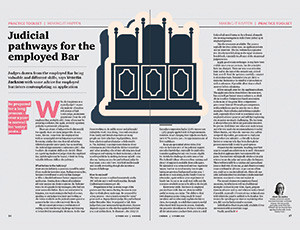*/

Brie Stevens-Hoare KC on preparing for judicial appointment applications and the JAC support for underrepresented groups
After six years as the Barrister Judicial Appointments Commission (JAC) Commissioner, I am as keen as ever to share some insights into the JAC selection processes and offer some advice about how to approach preparing for judicial applications – specifically, how to approach competency frameworks against which you will be assessed.
Established in 2006 following the introduction of the Constitutional Reform Act 2005, the JAC’s mandate is to ensure judicial appointments are independent, transparent and fair.
The Diversity of the judiciary combined statistical report, published annually by the Judicial Diversity Forum (JDF), demonstrates that since the JAC’s inception, it has overseen positive strides towards increased diversity in applications and appointments across all groups. Increasing judicial diversity is a collective effort that cannot be achieved by one organisation alone. There are various stakeholders and bodies that play crucial roles in this endeavour.
The JDF has launched collaborative initiatives that members work on together, including:
In January 2024, the JDF published its 2024 action plan, outlining key actions the activities its partners will undertake throughout the next year and the measures to evaluate the impact of each initiative.
The JAC Targeted Outreach programme and Judicial Guide scheme, co-badged with the judiciary, is designed to deliver even more in support of our statutory duty. We aim to help candidates overcome some of the barriers to judicial appointment that we know exist for underrepresented groups. By providing tailored resources and support, we strive to create a more inclusive and representative judiciary.
As of September 2024, the Targeted Outreach programme has received almost 1,000 applications. Candidates accepted onto the programme benefit from personalised support and guidance from JAC former Commissioners and/or experienced judicial guides. This comprehensive support system aims to empower underrepresented candidates, equipping them with the necessary resources and knowledge to navigate the process successfully.
Venetia Jackson authored a fantastic article in Counsel’s October 2023 issue, ‘Judicial pathways for the employed Bar’; which is recommended reading for all prospective applicants. Building on Venetia’s advice, we advise you to:
Things to avoid:
In summary, it is advisable to provide clear, concise and specific examples tailored to the competencies required for the judicial role, using plain language that can be easily understood by both legal professionals and lay members of the panel.
As Venetia highlights, do make full use of the resources available. The JAC is committed to providing comprehensive guidance and support for individuals considering applying for judicial positions. The JAC website is continually enhanced with valuable resources which include the following:
With frequent vacancies arising, there are numerous opportunities to apply once you feel ready. Should you be unsuccessful on your first attempt, there will be many future opportunities to apply for the same or similar vacancies. Sign up to the Judging Your Future newsletter to receive updates about open and forthcoming exercises.
It is important to remember the following. Being a judge is an important role in our society. The selection process is rightly hard and testing. There are a specified number of vacancies in any competition. We aim to see more than twice the number needed at selection days. Most people apply more than once. Not being appointed is not failure. It is one step nearer to the time you will be appointed.
Good luck!

Venetia Jackson’s article in Counsel’s October 2023 issue, ‘Judicial pathways for the employed Bar’, is recommended reading for all prospective applicants. See the 2023 official statistics on judicial diversity in England and Wales covering the current judiciary, judicial appointments and legal professions. See also the Judicial Diversity Forum 2024 action plan outlining key actions, activities and measures to evaluate impact.

After six years as the Barrister Judicial Appointments Commission (JAC) Commissioner, I am as keen as ever to share some insights into the JAC selection processes and offer some advice about how to approach preparing for judicial applications – specifically, how to approach competency frameworks against which you will be assessed.
Established in 2006 following the introduction of the Constitutional Reform Act 2005, the JAC’s mandate is to ensure judicial appointments are independent, transparent and fair.
The Diversity of the judiciary combined statistical report, published annually by the Judicial Diversity Forum (JDF), demonstrates that since the JAC’s inception, it has overseen positive strides towards increased diversity in applications and appointments across all groups. Increasing judicial diversity is a collective effort that cannot be achieved by one organisation alone. There are various stakeholders and bodies that play crucial roles in this endeavour.
The JDF has launched collaborative initiatives that members work on together, including:
In January 2024, the JDF published its 2024 action plan, outlining key actions the activities its partners will undertake throughout the next year and the measures to evaluate the impact of each initiative.
The JAC Targeted Outreach programme and Judicial Guide scheme, co-badged with the judiciary, is designed to deliver even more in support of our statutory duty. We aim to help candidates overcome some of the barriers to judicial appointment that we know exist for underrepresented groups. By providing tailored resources and support, we strive to create a more inclusive and representative judiciary.
As of September 2024, the Targeted Outreach programme has received almost 1,000 applications. Candidates accepted onto the programme benefit from personalised support and guidance from JAC former Commissioners and/or experienced judicial guides. This comprehensive support system aims to empower underrepresented candidates, equipping them with the necessary resources and knowledge to navigate the process successfully.
Venetia Jackson authored a fantastic article in Counsel’s October 2023 issue, ‘Judicial pathways for the employed Bar’; which is recommended reading for all prospective applicants. Building on Venetia’s advice, we advise you to:
Things to avoid:
In summary, it is advisable to provide clear, concise and specific examples tailored to the competencies required for the judicial role, using plain language that can be easily understood by both legal professionals and lay members of the panel.
As Venetia highlights, do make full use of the resources available. The JAC is committed to providing comprehensive guidance and support for individuals considering applying for judicial positions. The JAC website is continually enhanced with valuable resources which include the following:
With frequent vacancies arising, there are numerous opportunities to apply once you feel ready. Should you be unsuccessful on your first attempt, there will be many future opportunities to apply for the same or similar vacancies. Sign up to the Judging Your Future newsletter to receive updates about open and forthcoming exercises.
It is important to remember the following. Being a judge is an important role in our society. The selection process is rightly hard and testing. There are a specified number of vacancies in any competition. We aim to see more than twice the number needed at selection days. Most people apply more than once. Not being appointed is not failure. It is one step nearer to the time you will be appointed.
Good luck!

Venetia Jackson’s article in Counsel’s October 2023 issue, ‘Judicial pathways for the employed Bar’, is recommended reading for all prospective applicants. See the 2023 official statistics on judicial diversity in England and Wales covering the current judiciary, judicial appointments and legal professions. See also the Judicial Diversity Forum 2024 action plan outlining key actions, activities and measures to evaluate impact.

By the Chartered Governance Institute UK Ireland

Q and A with Major Susie Brooke, Legal Officer in Army Legal Services

Have you considered being a barrister in the British Army? Here’s an insight into a career in Army Legal Services

Clare describes her journey from Crown Prosecution Service legal trainee to Senior Crown Prosecutor, a typical ‘day in the life’ and the inspiration she draws from her career

What's it like being a legal trainee at the Crown Prosecution Service? Amy describes what drew her to the role, the skills required and a typical day in the life

Barristers can learn more about the varied arenas in which their mediation skills can be deployed at the Civil Mediation Council Annual Conference on 6 and 7 November 2024